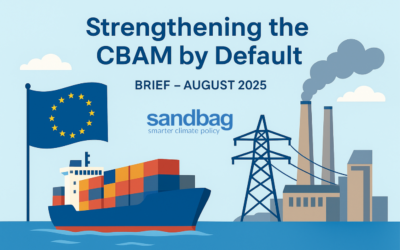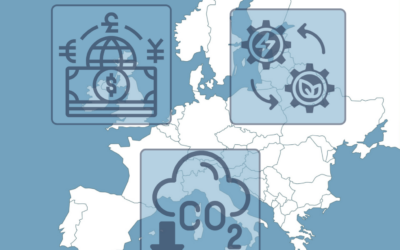This new brief from Sandbag sets out why expanding the scope to cover chemicals, polymers and refinery products is a critical and achievable next step for the CBAM.

The European Commission is reviewing whether more products should be brought into the scope of the Carbon Border Adjustment Mechanism (CBAM). Sandbag’s latest brief makes the case for expanding the CBAM to include organic chemicals, polymers, and refinery products — a significant gap in the current coverage.
About the brief
The objective of the CBAM is to prevent carbon leakage as free allocation under the EU ETS is phased out. While some key products like steel, aluminium and fertilisers are already covered, most chemicals remainexcluded — despite chemical plants and refineries accounting for about 30% of EU ETS industry emissions.
This policy brief explains why including more chemicals in the CBAM is necessary, and how key value chains can be covered initially, with a phased and targeted expansion of coverage over time.
Key findings
- Free allocation under the EU ETS is not fit for purpose – it creates market distortions and discourages investment in low-emission alternatives.
- The chemical and refinery sectors received 163 million free allowances in 2023, worth approximately €13 billion, yet the EU chemicals sector suggests carbon leakage is still taking place
- CBAM inclusion would create a more level playing field with carbon-intensive imports while providing better incentives for reducing emissions in the EU
- The complexity of the sector should not be considered an obstacle – initially the focus should be on including key value chains, with expansion of coverage over time
- Starting with key basic organic chemicals, their downstream polymers and upstream refinery products would be the simplest approach that would enable the phase out of most free allocation, while preventing avenues for circumvention.
Photo by Weerapong Khodsom from Getty Images
Related Publications
Aug 25th 2025
Aug 6th 2025
May 22nd 2025
More on CBAM
Strengthening the CBAM — by default
The consultation aims to address concerns that the CBAM has loopholes that could distort competition between products manufactured in the EU (covered by the EU ETS) and imported goods. Our response sets out proposals for how the design of the CBAM could be improved in these regards.
Extending the CBAM to indirect emissions
The European Commission is considering amending the Carbon Border Adjustment Mechanism (CBAM) to include indirect emissions of CO2 from the use of electricity in the manufacturing of CBAM-covered goods.
CBAM extension: Closing the emissions gap
Free allocation has long been used to address carbon leakage under the EU ETS, but it has key limitations. It only covers emissions up to benchmark levels, fails to reward cleaner EU producers, and forfeits auction revenues that could support decarbonisation. It also creates perverse incentives by making high-emission goods artificially cheap.



